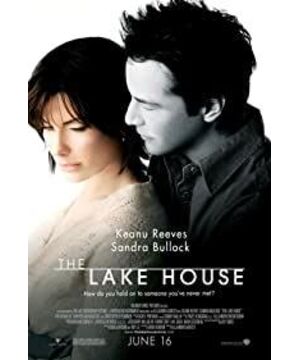I am a person who is easy to get into dramas, so when I watch the movie, I will easily believe that there are grudges in this world, that one day Spider-Man will become a hero to save the world, that meteorites will hit the earth in the future, of course, I also believe that there are Such a mailbox that can travel through time and space makes the hero and heroine in 2004 and 2006 fall in love. However, I cannot tolerate the ending arranged by the director.
Maybe I'm a perfectionist, but I don't deny that I like some happy endings - perfectionists just think that any deliberate happy ending is a blasphemy against perfection - and tragedy is sometimes a kind of perfection. Therefore, one of the responsibilities of the director is to let the comedy and comedy that should exist, or let the tragedy that should exist continue to be tragic. Even if the mutual conversion between tragedy and comedy, there must be a process of adapting and inheriting, and cannot go beyond group consciousness. bottom line.
One of the three founders of sociology, the French sociologist Emile Durkheim pointed out: In traditional society, a behavior is not because it is a crime that shocks the group consciousness, but is recognized because it shocks the group consciousness for crime. So, let's take a ten thousand steps back and say that even if the director shocks the consciousness of the individual, it will also cause strong discomfort to the individual. Sadly, the number of individuals does not seem to be small.
Of course, we can't say that the director is committing a crime. It seems that the influence of the ending of the movie is not caused by the director intentionally, but the choice of the ending is indeed the director's intention (I don't understand the process of movie production, maybe the screenwriter should be pulled down).
Let's take a look at the Japanese film "Now, I Want to See You". It is also a love that travels through time and space. There will also be a protagonist who will die - the heroine Leng. Then, the heroine finally died, although she who had been to the future knew that as long as she changed her husband now, her fate would change. However, the heroine did not. She has already fallen in love with her future husband in the future and has a second relationship. She loves her future child. She would rather let herself die in six years than let that child be born. Only six years to live, but also to be with the person she loves the most.
Some people will say that commercial films have to be made like this, some people say that it is the gap between Eastern and Western cultures, and even give an example that "Heroes in the West never die, but in the East they are heroes who die." But that was in the past. The debate in European and American films about whether a good person should die or not has been rationalized at the end of many films. Even in oriental films such as "Infernal Affairs" in Hong Kong, there are extremes where bad people seem to be immortal, of course. , as compensation, the director made the bad guy fall into the endless ideological hell, making life worse than death, but this ending did not exceed the bottom line of the social group in the end. The truth that evil is rewarded with good is manifested in different ways.
It can be seen that no matter what the ending is, as long as the film is a commercial film, it should conform to the market, conform to the people, and use the bottom line of the audience as a reference, rather than trampling arbitrarily between crossing the bottom line and not crossing the bottom line.
Those who should be alive should be boldly let them live, either to give the audience hope or indignation; if they should die, let them die with confidence, either to make the audience feel sympathy or to relieve their hatred, typical An example is the movie The Butterfly Effect 2 (perhaps this is the only positive aspect of this much-criticized film). Going the opposite way will not only fail to achieve the desired effect, but may contaminate the film and ruin its reputation. Therefore, any film has to be cautious when making it.
Today's film age is no longer a simple choice of dying, so the concept of balance has to be emphasized again and again. The balance between the director and the audience, the balance between art and reality, the balance between their own ideas and group consciousness, and so on. So:
To be , or not to be , that's a question.
View more about The Lake House reviews











